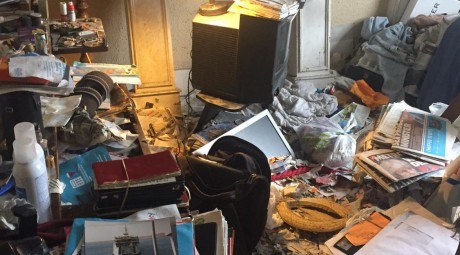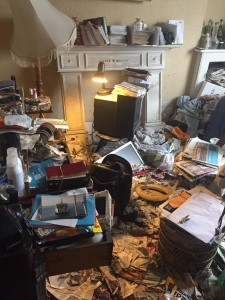Dealing with Hoarder Tenants
February 22nd, 2019

For any landlord or residential property manager, having a hoarder tenant in your property can be a real nightmare. A hoarding disorder is where someone acquires an excessive number of items and stores them in a chaotic manner, usually resulting in unmanageable amounts of clutter. The items can be of little or no monetary value.
Hoarding is considered a significant problem if:
- The amount of clutter interferes with everyday living – for example, the person is unable to make use their kitchen or bathroom.
- Damaging to the property
- Blocks or interferes with windows and ventilation.
- Cannot access rooms or emergency exits.
- The clutter is causing significant distress or negatively affecting the quality of life of the person or neighbours.
- Storing combustible items
- Keeping goods that attract black moulds, rodent and roaches.
Hoarding is a relatively common problem in the U.K, with about 1.2 million hoarders (many people keep things they don’t need), but only a small number of people will meet the clinical criteria for having a Hoarding Disorder.
Hoarding Disorder is most commonly defined by obsessional fears of losing important items that a person believes will be needed in the future, but accumulation of these items leads to clutter that can cover living and work spaces, making them unusable.
What to do:
- Proceed with caution: The mental capacity of the tenant will decide what step to take.
- Document the situation: Take note of the condition of the property using notes, pictures and videos.
- Notice: Notify the tenant of the need to remedy the situation.
- Offer Help: Try to work with the tenant to clear and clean up. Work with tenant’s next of kin or family members if necessary.
- In extreme cases: Contact Environmental Health Services.
- If there is a mental issue involved such as OCD or depression, you may contact social services.
- Get legal help
- Eviction: Serve the appropriate notice to get possession.
Many people with Hoarders disorder realise they have a problem but are reluctant to seek help because they feel extremely ashamed, humiliated or guilty about it. Hoarders have often been through a traumatic event and the situation should be handled with the sensitivity it requires. A good way to prevent such problems from occurring is to conduct periodic visits to properties before the situation gets out of hand.
For a non-obligatory conversation on this topic and other Landlord – Tenant matters, get in touch with us.


Leave a Reply